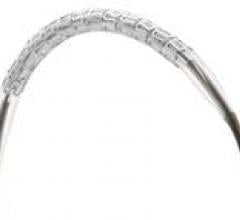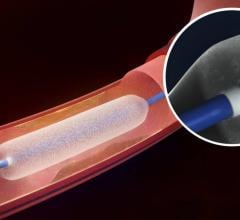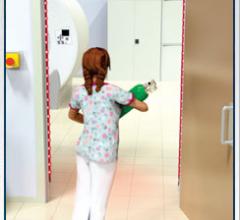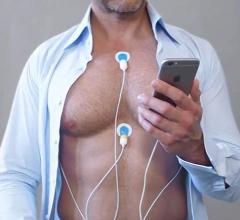
One-year patient outcomes from the PARTNER II trial showed the low rate of 30-day complications with balloon-expandable transcatheter aortic valve replacement (TAVR) in high-risk and inoperable patients with aortic stenosis persisted with follow-up to one year.
October 15, 2015 — U.S. Food and Drug Administration (FDA) has cleared Edwards Lifesciences Sapien XT transcatheter ...
Biotronik has announced results from the BIOSOLVE-II trial, investigating the safety and clinical performance of the world’s first clinically proven magnesium-based bioresorbable scaffold, at the Transcatheter Cardiovascular Therapeutics (TCT) 2015. The bioresorbable scaffold met its primary angiographic endpoint and demonstrated an outstanding safety profile. The announcement of clinical data from BIOSOLVE-II will be accompanied by publication in The Lancet.
Cardiac PET/CT represents a major advancement in cardiovascular diagnostics, offering significant clinical and ...
C. R. Bard Inc. announced the presentation of the 12-month results from the Lutonix Global Real-World Registry at the Transcatheter Cardiovascular Therapeutics (TCT) 2015 meeting. These results come just months after publication in the New England Journal of Medicine of the one-year data from the Lutonix 035 drug coated balloon (DCB) catheter pivotal, randomized LEVANT 2 trial.
Tryton Medical Inc. announced results from the pivotal Tryton Confirmatory Study confirming the acceptable acute safety profile of the Tryton Side Branch Stent for the treatment of coronary bifurcation lesions in vessels appropriate for a ≥2.5mm stent. Results were presented as part of the Featured Clinical Research session at Transcatheter Cardiovascular Therapeutics (TCT), the annual scientific symposium of the Cardiovascular Research Foundation (CRF) being held in San Francisco, California.
On Oct. 7, 2015, Cook Medical initiated a voluntary recall for select sizes of Beacon Tip Angiographic Catheters. This recall includes all lots of these select sizes of the Beacon Tip Angiographic Catheters. This recall is an expansion of the voluntary lot-specific recall issued on July 2, 2015.
SPONSORED CONTENT — Studycast is a comprehensive imaging workflow system that allows healthcare professionals to work ...
AtriCure Inc. announced it has entered into a definitive merger agreement under which AtriCure has agreed to acquire nContact Inc., a privately held developer of innovative cardiac ablation solutions.
Boston Scientific Corp. announced it has closed on an additional round of financing with MValve Technologies Ltd., developer of a percutaneous mitral valve replacement system designed to work with the Boston Scientific Lotus Valve. Boston Scientific has provided the company with funding since 2012 and has an exclusive option to acquire MValve.
Kopp Development Inc. has released a new entryway system for magnetic resonance imaging (MRI) rooms — FerrAlert Halo II Plus. This detection system dramatically reduces alarm fatigue by not alarming on the MRI door and ferromagnetic objects exiting the MRI room. Alarm fatigue reduction is a top priority for ECRI and The Joint Commission.
Providing exceptional cardiovascular care for patients to achieve the best possible outcomes is the number one goal for ...
The Lancet published results online that show Abbott’s ARCHITECT STAT High Sensitive Troponin-I (hsTnl) test may rule out myocardial infarction (MI) in two-thirds of very-low risk patients, allowing prompt discharge from A&E (Accident and Emergency). The study identified a precise new threshold of troponin of <5 ng/L which, together with other clinical factors, allows doctors to rule out heart attacks in the majority of patients, reducing prolonged waiting for monitoring with additional tests, unnecessary procedures and hospital admissions.
October 9, 2015 — Cardinal Health is launching its expanded portfolio in the cardiovascular space including the latest ...
Oregon Health & Science University (OHSU) now offers patients one of the most advanced computed tomography (CT) imaging systems available with the installation of Toshiba’s Aquilion ONE ViSION Edition. OHSU, a nationally prominent research university and Oregon’s only public academic medical center, acquired the new system to help improve its diagnostic capabilities for trauma, cardiac, stroke and pediatric patients. Adding the first 640-slice system in the state of Oregon allows OHSU to deliver better patient care and maintain its position as one of the leading health care institutions in the United States.
Cardiac positron emission tomography (PET) is growing in popularity among cardiologists because it provides the ability ...

Cardiovascular information systems (CVIS or cardiac PACS) have undergone a transformation over the past few years to ...
Shimadzu Medical Systems USA announced the availability of the MIX package for the Trinias Cardiovascular suites. Based on the three main operating concepts (SCORE Imaging, SMART Design and SMILE Concept) for Trinias, Shimadzu is providing new features for taking minimally invasive procedures to new levels.
Personal MedSystems introduced the first and only 22-lead mobile electrocardiogram (ECG) system, CardioSecur, at the European Society of Cardiology Congress 2015, Aug. 29-Sept. 2 in London.

 October 15, 2015
October 15, 2015













